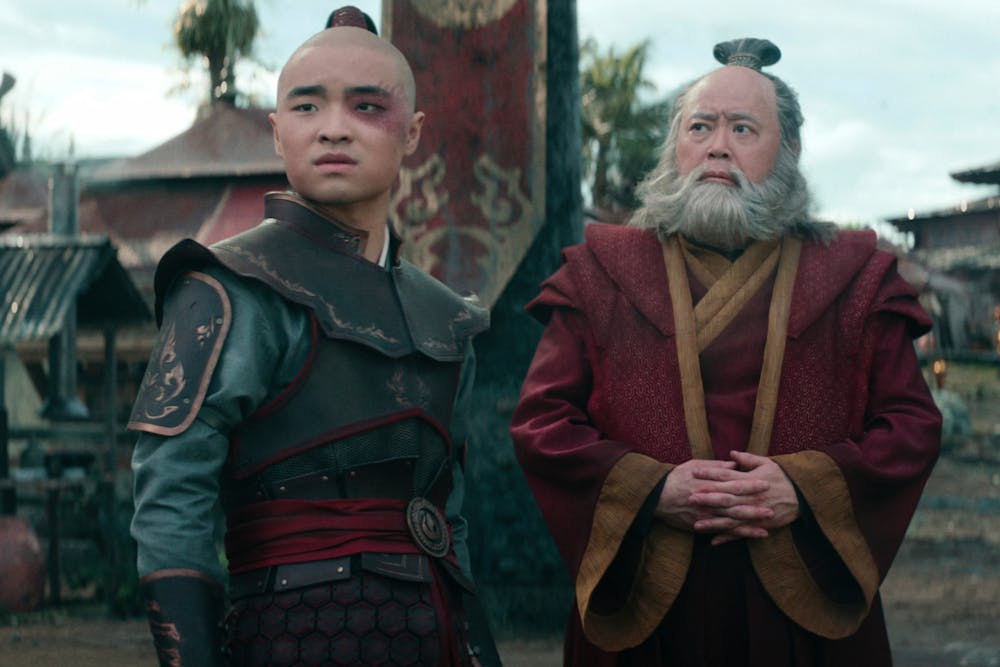This review contains spoilers for “Avatar: The Last Airbender.”
Netflix’s live-action “Avatar: The Last Airbender” adaptation is a refreshing, well-intentioned remake of Nickelodeon's original award-winning animated series.
Adapted from Michael Dante DiMartino and Bryan Konietzko’s 2005 animated series, the show follows the story of Aang (Gordon Cormier), the Avatar and last known airbender, as he embarks on a journey to master all four elements — water, earth, fire and air — and restore peace among their respective nations. With the help of his friends, waterbender Katara (Kiawentiio) and her older brother Sokka (Ian Ousley), the young Avatar sets out to end the Fire Nation’s century-long war against the other nations.
Albert Kim, known for producing “Nikita” and “Sleepy Hollow,” served as both writer and producer for the Netflix adaptation. Under Kim, Netflix’s “Avatar” faced difficult themes head-on.
This adaptation doesn’t sugarcoat the Fire Nation’s genocide against the Air Nomads. Instead, it shows harrowing scenes of destruction and violence as one of the four nations is wiped from the “Avatar” world, something that was mentioned but never depicted on screen in the original series.
The live-action series’ darker approach to conveying themes seen in the original cartoon is what sets it apart from the original series. When viewers witness a cruel, unforgiving Fire Lord Ozai (Hiro Kanagawa) burn a group of revolutionaries to a crisp just five minutes into the series premiere, it’s clear this adaptation aims to take a different approach to the story than previously seen. That’s likely because the cartoon was made primarily for (you guessed it) children.
However, the adaptation’s biggest downfall is its pacing. It attempts to condense 20 episodes worth of plot from season one of the original series into eight tightly-packed episodes. The adventure gets a little convoluted at times as key plot points are squished together to save time.
Lots of what makes “Avatar” so fun to watch is all the little side quests and tasks characters end up doing while working toward their ultimate goal. Unfortunately, when working with a tight eight-episode series, sacrifices had to be made.
While Netflix’s live-action is far from perfect, it did get one thing right: its cast of actors and actresses of Indigenous and Asian backgrounds, something M. Night Shyamalan’s 2010 live-action “Avatar” movie failed to deliver.
Ian Ousley dazzled as Sokka, bringing a nice balance of charm and wit to the character while also showcasing Sokka’s determination to protect his tribe and his little sister, Katara. While I enjoyed Sokka in the original animated series, Ousley brought the character to the next level, showing that Sokka too — as goofy and fun as he can be — also has his own hurdles to overcome as he struggles with his identity and role in a war-stricken world.
Kiawentiio’s performance as Katara isn’t as strong but is nonetheless enjoyable to watch, though it would be interesting to see a little more anger and passion in her bending. At times in the live-action, Katara appears simultaneously sentimental yet shallow. While compassion is one of Katara’s greatest strengths, she is also a fierce fighter with a commanding presence, something we have yet to see in Kiawentiio’s character. Gordon Cormier also didn’t quite nail Aang’s character, though both will likely grow into their characters with another two seasons to go.
Dallas Liu really stole the show as Zuko, the exiled prince of the Fire Nation. Season one Zuko is hard to like in the cartoon. But Liu found the perfect balance between Zuko’s frustration in his hunt for the Avatar and his vulnerability and compassion buried underneath rage and hurt. Another stellar performance comes from Paul Sun-Hyung Lee (Iroh), Zuko’s wise and caring uncle who always has Zuko’s best interest in mind, even when Zuko’s own self-preservation skills are lacking.

Courtesy of Netflix
Arguably one of the best scenes in the first season is one that never existed in the original cartoon. In episode three, “Omashu,” viewers see a tender moment between Zuko and Iroh at Lu Ten’s funeral, Iroh’s son who died during his father’s six-hundred-day Siege of Ba Sing Se. While Sun-Hyung Lee’s Iroh is silent during the scene, his face says it all: the traumatic impact of Lu Ten’s death changed his entire life trajectory.
While Iroh sits alongside Lu Ten’s casket quietly mourning the death of his son, Zuko approaches to pay his respects to Iroh. Zuko’s initial condolences are short and brief, but when he goes to walk away, he stops and returns to his uncle.
“When my studies weren’t going well and father wasn’t happy, Lu Ten gave me this,” Zuko said, pulling out a coin. “He’d won it for finishing first in his officer class. He said, ‘It should belong to someone destined to do great things.’ It gave me strength.”
Zuko then placed the coin in his uncle’s right palm before closing it.
“Lu Ten never needed it because he was the strongest person I ever knew,” Zuko finished before sitting beside his uncle as an instrumental version of “Leaves from the Vine” swells, evoking waves of sadness I haven’t felt since I first watched “The Tales of Ba Sing Se,” the cartoon episode this song was written for.
This small moment of compassion laid a strong foundation for viewers to better understand the pair’s relationship and love while also showing that Zuko is a far more complex character than he initially appears. Liu’s acting in this scene was heartbreaking but so authentically Zuko.
No adaptation will appease every fan, nor will remakes typically surpass their original in love garnered by fans. Nevertheless, Netflix’s live-action “Avatar: The Last Airbender” proves to be an enjoyable retelling of a well-loved show.
The live-action “Avatar: The Last Airbender” is now streaming on Netflix. If you are eager to know what happens next, all three seasons of the animated 2005 “Avatar: The Last Airbender” are also streaming on Netflix.
Anna Kleiber is the state news editor for The Daily Cardinal. She previously served as the arts editor. Anna has written in-depth on elections, legislative maps and campus news. She has interned with WisPolitics and Madison Magazine. Follow her on X at @annakleiber03.






